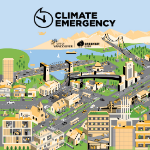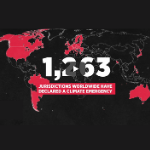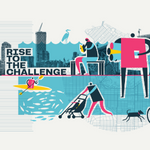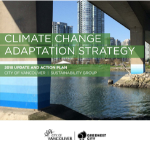
NOVEMBER 2024
IN THIS ISSUE
- Share your thoughts on Vancouver’s Villages
- Adopt a catch basin
- Learn about climate risks with the Hazard & Risk Explorer
- Celebrate Sustainability Scholars research
Interested in learning how to identify, report and prevent the spread of invasive plants on your property? Metro Vancouver has developed best management practice guides in collaboration with the Invasive Species Council of Metro Vancouver and other organizations to address invasive plants, one of the leading causes for our loss of biodiversity. Read the guides or take a free online course to learn more.

SHARE YOUR THOUGHTS ON VANCOUVER’S VILLAGES
What’s a Village? Picture a lively smaller-scale neighbourhood with a mix of low-rise housing types, a block or two of businesses and services, and vibrant public spaces – all within a short walk, roll or bike ride from home or work.
Goals of the Villages Planning Program include:
- Adding ‘missing middle’ housing for different income levels and family sizes, making Villages more diverse and inclusive.
- Growing commercial opportunities by adding retail spaces – creating lively neighbourhoods that draw more people to support local businesses in the area.
- Shaping complete, connected neighbourhoods by bringing more of what people need close to home, reducing reliance on personal vehicles and encouraging active transportation and transit use.
YOUR TURN
We want to hear what you love about Village areas and what changes would help these neighbourhoods thrive in the future. This feedback will contribute to shaping early directions of a draft plan.
- Take the survey until January 3, 2025.
- Attend an in-person or virtual open house starting November 20.
- Sign up for the project mailing list.

ADOPT A CATCH BASIN THIS FALL
When you adopt a catch basin, you’re helping your community and local ecosystems by:
-
Reducing flooding and keeping streets safer for pedestrians, cyclists and drivers.
-
Minimizing the risks of pollutants flowing into local streams and wildlife habitat.
-
Protecting homes and businesses from the impacts of flooding.
YOUR TURN
Consider one of the over 39,000 catch basins that need adopting and follow these three easy steps:
-
Choose and name your catch basin.
-
Check your inbox for a welcome package.
-
Let the catch basin care begin.
SUPPORTING: CLIMATE ADAPTATION, RAIN CITY STRATEGY

LEARN ABOUT CLIMATE RISKS WITH THE NEW HAZARD & RISK EXPLORER
The Hazard & Risk Explorer can help you:
- Create a plan to protect those who are disproportionately impacted
- Prepare your home and gather supplies for each hazard
- Find cleaner air spaces, cooling centres and other City resources
-
Take the Emergency Preparedness Survey until November 15. Share your thoughts and help shape the future of emergency preparedness and climate hazard education programs in the city.
-
Download the Altertable app. This free public alerting app will notify you with clear, direct instructions in the case of local emergencies and urgent incidents.
-
Attend an emergency preparedness workshop on November 20 or December 10.
-
Read the printable hazard fact sheets with critical risk and preparedness information for four top hazards. Available in 12 languages.

CELEBRATING SUSTAINABILITY SCHOLARS RESEARCH
Since 2010, the UBC Sustainability Hub and the City of Vancouver have worked together to provide UBC graduate students an opportunity to work on projects that advance climate action and sustainability in Vancouver. Over 250 projects have been completed to date, with many providing valuable research that supports implementation of the Climate Emergency Action Plan, Climate Adaptation Strategy, Healthy City Strategy, Equity Framework, and more.
A few examples of the projects completed this year include:
-
Improving accessibility at rapid transit stations and plazas
-
Improving Bicycle and Scooter Parking at Elementary and High Schools in Vancouver
-
Research to quantify the carbon capture of street infrastructure assets
Interested in learning more? Check out this year’s Scholar reports in UBC’s project library.
The 2025 Sustainability Scholars program is just around the corner. If you're a UBC graduate student, check UBC's webpage for an information session in January to learn how to apply for the summer 2025 program.
SUPPORTING: CLIMATE EMERGENCY, ADAPTATION

Fall Planting and Blackberry Blast
November 16
Whether you’re a seasoned gardener or first-time planter, join Still Moon Arts Society for an afternoon of removing invasive blackberry bushes, planting native species and supporting habitat restoration.
Renfrew Community Park
Douglas Park Community Clean-Up
November 16
Help keep Douglas Park free of litter and debris. Tongs and garbage bags will be provided. Refreshments will be available at the end of the event.
Douglas Park East Field
Covering Climate on the Frontlines Webinar
November 20
Join journalist speakers for a virtual webinar on climate disasters and the stories of survivors. Co-hosted by the Pacific Institute for Climate Solutions and the Climate Disaster Project.
Virtual
EcoStewards
November 23 & December 7
Volunteer with the Stanley Park Ecology Society to take part in hands-on invasive species removal and make an important contribution to habitat conservation and restoration.
Stanley Park Ecology Society Office
Everett Crowley Park Stewardship
November 23
Join this monthly stewardship event to remove invasive plants and learn more about the history and ecology of Everett Crowley Park.
Everett Crowley Park
Climate Action Dialogues: Human Health and Well-being
November 26 & 28
Explore how climate action impacts health and well-being in this forum hosted by Metro Vancouver with panelist talks and interactive Q&A sessions.
SFU Morris J Wosk Centre for Dialogue & Online
“Beaver’s Voice” Virtual Climate Action Youth Forum
November 15-30
Are you part of an Indigenous school, class, or club? Register in this virtual self-paced series of Indigenous-led workshops for grades 5-8 across Canada and learn to take a Two-Eyed Seeing approach to climate change issues.
Virtual
DIY Beeswax Wraps & Zero Waste Workshop
December 8
Learn to make beeswax wraps, an eco-friendly alternative to plastic cling wraps, and other zero waste tips. Registration required, $25 fee for adults, $11 fee for seniors 50+.
False Creek Community Centre
Farmer’s Markets
Wednesdays, Saturdays and Sundays
Downtown, Kitsilano, and Riley Park farmers’ markets are open for winter! Visit their website to plan your visit and learn about the market’s local farmers, food producers and creators.
Various
Connect and learn more
Vancouver.ca Twitter Facebook Talk Vancouver LinkedIn Instagram
City of Vancouver - 453 West 12th Avenue - Vancouver - BC - V5Y 1V4



